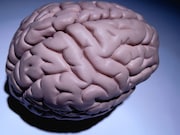Clinically unresponsive brain-injured patients with EEG response to spoken commands might improve
WEDNESDAY, June 26, 2019 (HealthDay News) — Early after acute brain injury, 15 percent of clinically unresponsive patients have electroencephalographic (EEG) evidence of brain activation in response to spoken motor commands, according to a study published online June 26 in the New England Journal of Medicine.
Jan Claassen, M.D., from Columbia University in New York City, and colleagues studied a consecutive series of patients with various acute brain injuries in a single intensive care unit who were unresponsive to spoken commands. In response to commands to move their hands, patients’ brain activation was detected by applying machine learning to EEG recordings.
The researchers found that 15 percent of the 104 unresponsive patients had brain activation detected by EEG at a median of four days after injury. In 50 percent of these 16 patients and 26 percent of the 88 patients without brain activation, their condition improved to the extent that they were able to follow commands before discharge. At 12 months, 44 percent of those with brain activation and 14 percent without had a Glasgow Outcome Scale-Extended level of 4 or higher, indicating the ability to function independently for eight hours (odds ratio, 4.6; 95 percent confidence interval, 1.2 to 17.1).
“Though our study was small, it suggests that EEG — a tool that’s readily available at the patient’s bedside in the ICU in almost any hospital across the globe — has the potential to completely change how we manage patients with acute brain injury,” Claassen said in statement.
Copyright © 2019 HealthDay. All rights reserved.








